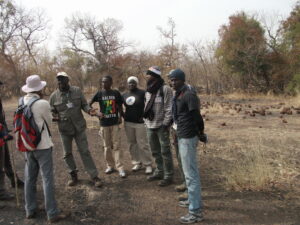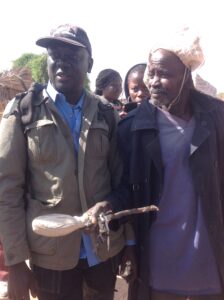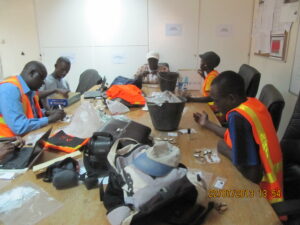Interview: Ibrahima Thiaw

Dr. Ibrahima Thiaw is Director of Anthropology at Institut Fondamental d’Afrique Noire /University Cheikh Anta Diop of Dakar, Senegal. In 2017 Dr. Thiaw’s institution received a Wenner-Gren Institutional Development Grant to support the development of a doctoral program in anthropology. We recently reached out to Dr. Thiaw to discuss what originally drew him to the field of anthropology and to ask him his thoughts on anthropology in Senegal and how he hopes the Institutional Development Grant will help his department.
First can you tell us a bit about yourself and how you came to be interested in anthropology?
My interests in anthropology are tightly intertwined with my life experience, one that was profoundly shaped by the politics of identity, at home in my native village, in Senegal, my home country, as well as internationally. As a young man, I was struck by modern contradictions within Senegalese society that I experienced from various vantage points. These were most manifest in the tensions between the city and the countryside, between hegemonic and marginalized ethnolinguistic communities, between world religions and local ones, as well as between different class, status and gender groups. All of these have shaped who I am today as a scholar born in a small village in inland Senegal, but who, moved by the tradewinds of academic life, has become a citizen of the global world.
As a child from a rural area and from an ethnic minority group, I experienced the distasteful jokes and forms of cultural othering common in Senegal, and widely accepted today when discussing cultural differences (ethnicity), physical appearance (race), and class, status and gender (social differences), even among well-educated people. As I began my undergraduate schooling in the mid-1980s, debates ignited by Cheikh Anta Diop against colonial anthropology helped me sharpen my consciousness of the role of anthropology in shaping past and present identities, and intercultural interactions. With time, however, I grew weary of Diop’s questionable historical and genealogical readings, and distrustful of narratives rooting identity in authenticity and cultural nationalism. I went into archaeology because I believed in the power of material empirical evidence to explore the human experience and open history to accounts of human life left out of documentary archives. Despite the limits of its different sources of enquiry, anthropology remains a credible window for a long-term exploration of cultural experience, but also a space for creatively imagining different presents and futures. For that very reason, anthropology offers a utopian stance, one that always bears a specific project for collective hopes and future improvements of the human experience via scholarship and education.

Who have been the anthropologists that have most influential in your own personal formation and why?
Senegalese scholar Cheikh Anta Diop, who drew on ancient civilizations (Egypt in particular), archaeology, and bioanthropology to unravel the modern foundations of European political and economic domination, was a major influence on my undergraduate self. In the context of the mid-1980s, these ideas were very attractive to many students of my generation who were exposed to a deep economic and political crisis marked by a series structural adjustments and political unrest impacting severely the academia; to many of us, these turbulences were linked to the expansion of neocolonial and neoliberal economies. I also became fascinated with the work of the French anthropologist, Andre Leroi Gourhan, because it dwelled less on origins and racial identity, but attended instead to the human experience, articulating neatly culture and technological development. In the 1990s, it was the work of my academic advisers, Susan K. McIntosh and Roderick J. McIntosh, that had the biggest influence on my professional growth. Their research in the floodplains of the Inland Niger Delta and the Middle Senegal Valley, which examined the conditions of emergence of early urban settlement, specialization, long-distance trade, identity formation and sociopolitical organization, and their articulations with climate and environmental changes, had a huge impact on my intellectual growth. Their perspectives, I believe, contributed to dismantling the long-held assumptions that Africa and Africans only participated marginally to world’s sociopolitical and economic development, and invited us to look more carefully at African agency in the production of culture at a time of growing interactions with the external world. It is in this context that I discovered the work of Eric Wolf, and Africanist anthropological archaeologists, such as Christopher DeCorse, and Ann B. Stahl, who offered unique insights into the historical anthropology of Atlantic impacts in Western Africa.
Can you tell us a little about anthropology in Senegal? What are the pressing questions and concerns for the discipline there?
In Senegal, anthropology has long been associated with colonial-based knowledge; as such, it was embedded in racial and cultural prejudice, and was distrusted for that reason. Anthropology’s roots were in French imperialism and French academia, with a firm commitment to evolutionary thinking, the study of language and ethnic identification and classifications to aid colonial governance, order, and discipline; paradoxically, it was also associated with colonial humanism, often tainted with some form of paternalism. Until now, anthropology in Senegalese academia continues to dwell largely on those cultural classifications that were created and/or fossilized by the colonial library, reifying notions of identity as stable trans-historical entities conveying the ‘substance’ of ethnic identities today. In that, anthropology in Senegal has failed to seriously examine the dynamics of power, history, and cultural change that are inherent to all cultural formations.
The pressing issues are not only to bring together the different subfields of anthropology for disciplinary conversations and revival, but also to decolonize the field by deconstructing its concepts, methodologies and theoretical orientations. A key concern is to work at redefining anthropology’s relations to power, knowledge production, and identity in order to renew and rebuild relations with communities, so that it becomes a problem-solving discipline rather than a source of problems.
After a lot of soul-searching and internal/external critique, it is time that anthropology ceased to be a mere instrument of domination at the service of power — or at best ignorant of power and thus complicit with it — to become a problem-solving discipline. This IDG will engage students on issues of critical importance to modern Senegalese society, including pressing matters of cultural differences and diversity, religious and cultural tolerance, ethics, resource management, environmental changes, gender equality, etc., to assist future policy-making, and propose credible and well-informed solutions to build better futures. This IDG will help us build trust between the disciplines of anthropology and policy-makers on one hand, and on the other, between the disciplines and local communities. In restoring that trust, anthropology is poised to become a usable instrument for governance and public education, and assume a central role in developing a new sense of citizenship, nationhood, and personhood.

Is anthropology a subject that attracts students in Senegal?
Some subfields of anthropology, such as archaeology and linguistics, attract large numbers of students in Senegal, while others, like cultural anthropology and bio-anthropology, because of their quasi-absence in the curriculum, count virtually no student. Parts of our efforts with this IDG will consist in strengthening the existing curricula in archaeology and linguistics, but also rebuilding the fields and relevance of cultural anthropology and bio-anthropology.
Can you tell us about your department, its specialties and how the award will help your department as it moves forward?
The Social Sciences Department of the Institut Fondamental d’Afrique Noire (IFAN), includes disciplines such as archaeology, history, geography, and sociology. Over the past decades, however, these different scholarly fields remained largely disconnected from one another, quite often ignoring contributions from their colleagues next door. IFAN has also a linguistic laboratory, but it is part of the Department of Languages and Civilizations. Currently, there is need to create new synergies in the organisation of our departments and the training of our students. This IDG will bring together archaeologists, linguists, cultural and bioanthropologists, not only from the University Cheikh Anta Diop of Dakar, but also from other universities in Senegal, such as the University Gaston Berger of Saint Louis and the University Assane Seck of Zinguinchor, to renew and develop conversations in anthropology. With the support of our different partners from the University of Chicago, Florida International University, Michigan State University, Smithsonian-National Museum of African American History and Culture, Rice University, William and Mary College and, University of Yale, we will develop new curricula that are bettter-adapted to Senegalese culture, politics, and needs in the twenty-first century.